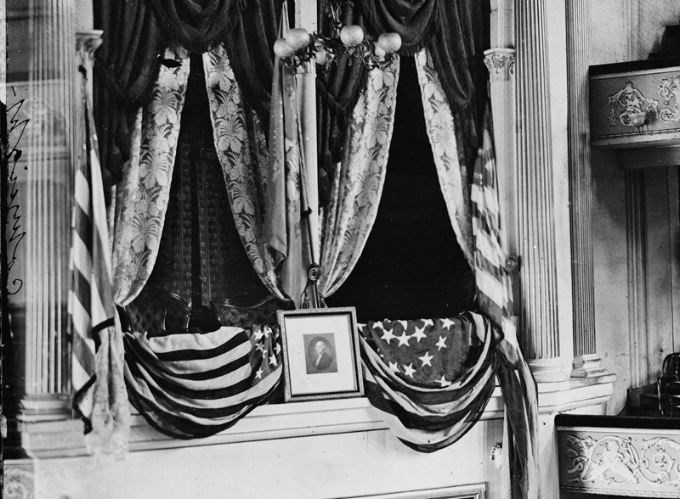Today is the 150th anniversary - the sesquicentennial, to be precise - of Abraham Lincoln's assassination.
The former U.S. President's personal lore has only increased since that time and the world is holding celebrations of his legacy.
Prince George author Paul Serup is so fascinated by this that he is currently on a tour of important Lincoln locations, and had travel plans to be in Washington, D.C. to mark the occasion.
It was there, at Ford's Theatre on April 14, 1865, at approximately 10:15 p.m., sitting on the lefthand side of his wife during a performance of the play Our American Cousin, that celebrity actor John Wilkes Booth entered their balcony viewing box, pulled a Philadelphia Deringer pistol, and fired a single ball at point blank range. It struck Lincoln's head as the President and the other 1,700 people in the theatre were laughing at a line Booth knew would cause a roar to muffle his gunshot. The President and First Lady were holding hands at the time.
Lincoln died the next day.
That fatal pistol report triggered spectacular amounts of speculation and investigation over the ensuing years. Booth was himself a source of interesting research. He escaped the theatre, suffering a broken leg in the process, and for days was harbored by a circuit of coconspirators and sympathizers as the authorities pursued him. He was cornered in a barn and was shot dead by a U.S. cavalry unit 11 days later.
His coconspirators were another source of historic fascination. Lincoln was not the only government official targeted that same night. Booth and a small group of radicalized white supremacists were attempting to cause the downfall of the Union government, since the Confederate Army had officially surrendered to Lincoln's forces five days before Booth and company attempted to dethrone the main power players of elected government in one putsch. They also set out to kill Secretary of State William Seward, who was wounded in the event, and Vice-President Andrew Johnson, who was unscathed.
There was a roundup of suspects. A trial convicted eight people: four were hanged, three were given life sentences, one for a six-year prison term.
Most of the suspects were arrested in short order but one, John Harrison Surratt Jr., fled to Canada, then to Europe, and eventually to Egypt where he was nonetheless discovered by investigators about 18 months later and extradited back to face trial. He was acquitted controversially.
It was through the initial escape of Surratt that the world learned of possible systemic Catholic sympathy for the murder of Lincoln. Surratt was allegedly aided and abetted by Catholic connections in Quebec and Europe.
One of the world's leading religious figures of the day, Canadian-American celebrity priest Charles Chiniquy (he wrote the 1885 blockbuster book 50 Years In The Church of Rome), was adamant that his friend Lincoln (Lincoln, prior to his presidency, was Chiniquy's lawyer) had been the victim of a Vatican plot that used Confederate sympathizers as convenient pawns.
This is the hypothesis Serup delves into with his book Who Killed Abraham Lincoln? published in 2011 by Salmova Press.
"I've spent a lot of my life looking at this," said Serup the day before departing for Chicago where Chiniquy was a high-profile Catholic priest before he and that organization had a publicly displayed falling out. Chiniquy then became an aggressive Presbyterian minister and author.
"It's pretty historic moment, the sesquicentennial, and while I'm there I'd love to talk to some of the people who are in touch with that history," said Serup. "Since Lincoln's death, every year there are, on average, about 100 books written on Lincoln. That fact was emailed to me by Dr. James Cornelius (curator of the Abraham Lincoln Collection at the Abraham Lincoln Presidential Library and Museum). He estimated 17,000 different volumes are in print. And there is still this Canadian connection that is so fascinating, and mine is one of the few books by a Canadian author on Lincoln."
Serup is now considering turning his pen specifically to Lincoln's famed client Chiniquy. Only one biography seems to exist, said Serup, and that is the academic book The Controversial Conversion of Charles Chiniquy (Texts & Studies in Protestant History & Thought in Quebec) written by University of Montreal professor Dr. Richard Lougheed, published in 2009 by Clements Publishing.
The press house said in their abstract of the book that Chiniquy "was rated as a superior orator to Prime Minister Wilfrid Laurier and Joseph Papineau. Most Quebec households had a portrait of him (and) at his death the New York Times and the Times of London gave him headlines. Yet few Canadians in our generation have ever heard of him." The preamble went on to say "researchers will find invaluable data for further research" in Lougheed's book. Serup may be that inquisitive researcher.
"Chiniquy was a major Chicago figure and a major Quebec figure, world famous, but it's hard to find anyone anymore who's ever heard of him," Serup said. "I believe there has been a major censorship movement against him. I'm interested in why it is the people of Chicago don't know more about him now. He was a significant, celebrated personality. The Chicago Tribune put his 80th birthday on the front page of the paper in 1889. In his book, Richard Lougheed said Chiniquy is still Canada's bestselling author of all time, but the Library of Chicago doesn't even have a copy of his book. Lougheed's book isn't there either. They have nothing by or about him. Why?"
Booth might have known his gunshot would set off a powder keg of historical observation. Lincoln was America's first assassinated president, after all. The assailant could never have predicted there would be ricochets to Egypt, the Vatican, Chicago and even - 150 years after the curtain fell on My American Cousin and Lincoln himself - the Canadian city of Prince George.



